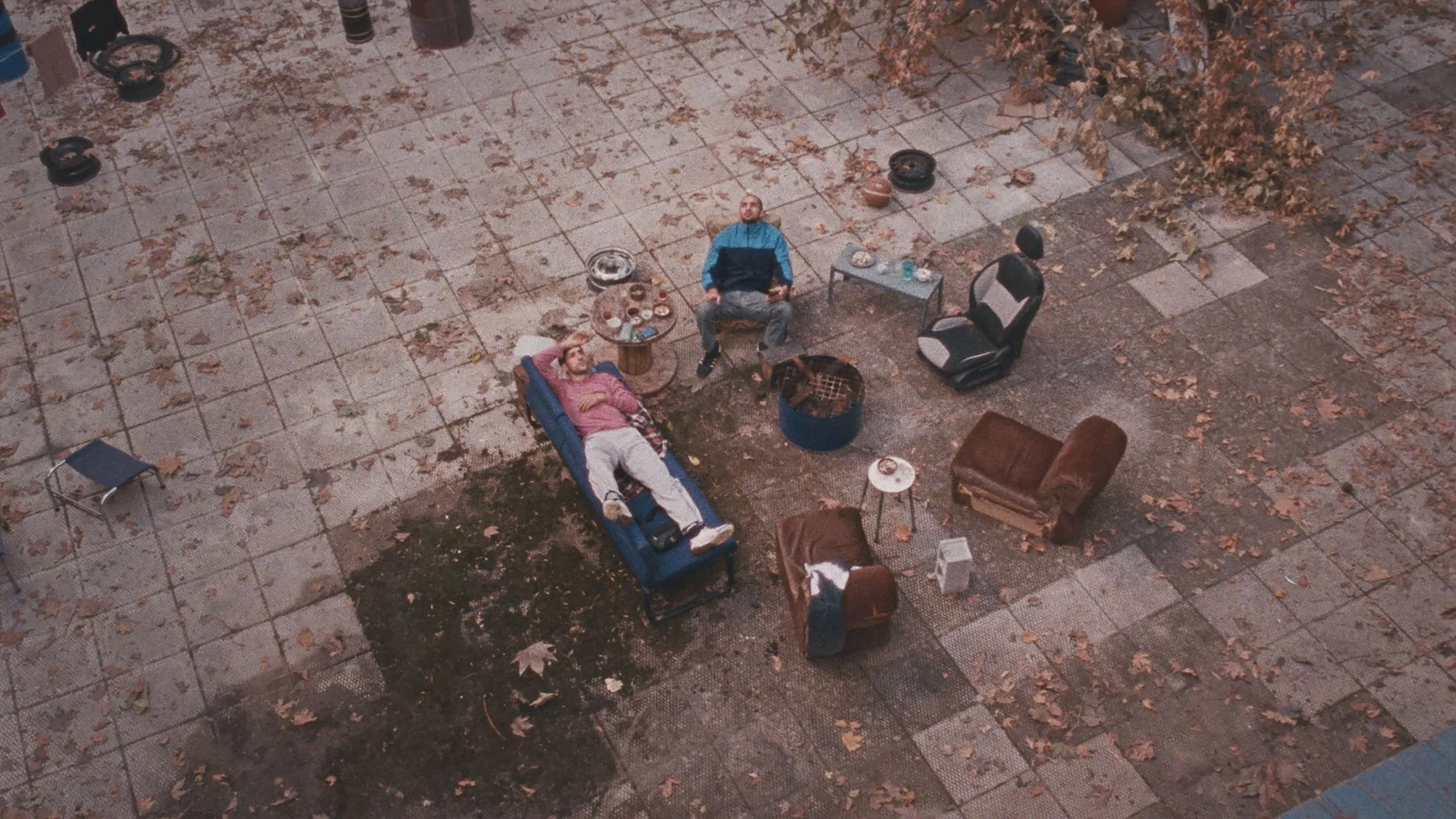To a Land Unknown
The Danish-Palestinian director Mahdi Fleifel turns his focus on Palestinian refugees struggling to make ends meet in Athens.
Image courtesy of Conic.
Born in 1979, Mahdi Fleifel, who is of Danish and Palestinian descent, has been making films since 2003 but most of them have been short works and To a Land Unknown is only his second full-length piece. Its predecessor was the award-winning documentary A World Not Ours made in 2012 and that was a work focused on displaced Palestinians living in a refugee camp in Lebanon. The present piece uses actors and is set in Athens but the situation facing Palestinians which has been central to Fleifel’s output is again a crucial element. To a Land Unknown is about two Palestinian men, Chatila (Mahmood Bakri) and Reda (Aram Sabbagh). They are cousins travelling together having escaped from Lebanon and their hopes are now set on reaching Germany where they plan to set up a café.
Although To a Land Unknown is a work of fiction, it plays very realistically and Fleifel and his co-writers have created a story which reflects the real-life plight of so many immigrants today. Indeed, while the film reflects the director’s concern about Palestinians, audiences will also see it as a story that speaks no less potently of the experiences of others similarly placed but from different countries. Nevertheless, this wider relevance does not compromise its impact as a personal tale centred on two distinctive and well-drawn characters. Fyzal Boulifa and Jason McColgan share the screenplay credit with the director and it is to their credit that in asking for our sympathy for such men as Chatila and Reda they never seek to encourage that response by sanitising their characters and making them improbably saintly.
To a Land Unknown is undoubtedly a better film for making its central figures human enough to be decidedly imperfect. Chatila who is in his twenties is very much the leader and the one who has realised that their situation is one in which they must do whatever it takes to survive. If they are to realise their dream of settling in Germany – a plan which for Chatila involves the expectation that in time he can be joined there by his wife and young son left behind in a refugee camp in Lebanon – they will need forged passports and that will cost money. Thus, it is that the film’s opening scene finds Reda assisting his cousin by helping him rob a woman seated in a city park. Sheer desperation has led to this kind of behaviour and it will drive Chatila even further in order to cover the money that Marwan (Munther Reyahneh) demands if he is to procure the necessary papers. There is a further problem too in that Reda has an issue of his own having become a drug addict who all too readily relapses when a dealer, Abu Love (Mouataz Alshaltouh), hovers. Indeed, the habit is so strong that Reda will steal from the funds that Chatila is building up to pay for more heroin.
The need to raise more money leads to Chatila concocting a scheme in which a Palestinian teenager encountered in Athens – that's the orphan Malik played by Mohammad Alsurafa – will be helped to fly out to his aunt who lives in Italy. To achieve this Chatila persuades a needy local acquaintance, Tatiana (Angeliki Papoulia), to travel with the boy pretending to be his mother. Charging for getting Malik to his destination will add immensely to the funds that Chatila and Reda so desperately need. Aided by Fleifel’s substantial experience in documentaries and by the conviction of his two leading players (Bakri is particularly impressive in the way he fully realises Chatila’s character), the film plays on a very realistic note for much of its length, a fact that has encouraged some critics to compare this film with that classic of neo-realism, Vittorio De Sica’s Bicycle Thieves.
It's a tone that seems to give this film its character and my only reservation regarding the first two-thirds of it lies in the portrayal of Tatiana. She becomes Chatila’s girlfriend in scenes that convincingly make us wonder just how far Chatila is merely using her as a necessary part of his scheme concerning Malik. But, through no fault of the actress, Tatiana's characterisation is less than wholly persuasive. However, such a degree of realism has been established that a yet more elaborate plan to pay for the vital passports, one central to the last third of the piece, takes on a more fictional air. In addition to that one finds that the concluding scenes feature a turn of events that is more to do with chance than with the fact that Chatila and Reda are immigrants. Because this is something that ensures a downbeat ending, the final impression is of a work that has been contrived to conclude that way. To a Land Unknown is undoubtedly deeply felt but, as a compelling and unsentimental view of the lot of refugees and the cost of being in that position, its best scenes come early rather than late.
MANSEL STIMPSON
Cast: Mahmood Bakri, Aram Sabbagh, Angeliki Papoulia, Mohammad Alsurafa, Mohammad Ghassan, Manal Awad, Munther Reyahneh, Mouataz Alshaltouh.
Dir Mahdi Fleifel, Pro Geoff Arbourne and Mahdi Fleifel, Screenplay Fyzal Boulifa, Mahdi Fleifel and Jason McColgan, Ph Thodoros Mihopoulos, Pro Des Ioanna Soulele, Ed Halim Sabbagh, Music Nadah El Shazly, Costumes Konstantina Mardiki.
Inside Out Films/Nakba Filmworks/Homemade Films-Conic.
106 mins. UK/Greece/Denmark/Netherlands/Occupied Palestinian Territory/France/Germany/Saudi Arabia/Qatar. 2024. UK Rel: 14 February 2025. Cert. 15.


